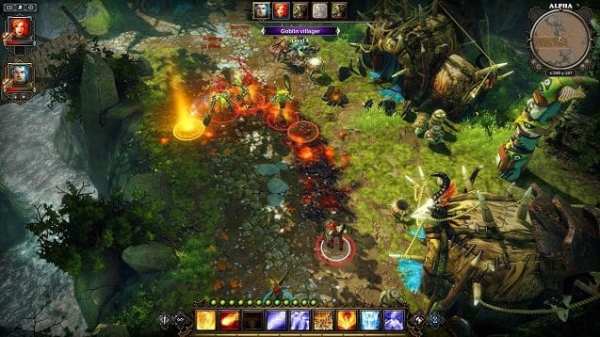I’ve only spent a few hours with the Early Access build of Divinity: Original Sin 2, but it already feels like Larian Studios has improved upon the original game in almost every way possible. With Divinity 2, the role-playing aspect of the game has been truly enhanced, and the characters that you build now feel like they have more purpose and agency in the world that they’ve been thrust into.
While you are able to customize your characters and make them your own, Larian Studios has also provided four Origin Stories that you can choose from in this Early Access build. Each Origin Story gives your character a unique backstory and disposition, allowing them to interact with the world and the NPCs in different ways. Choosing one Origin also means that the other ones that you left untouched can also appear as NPCs in the game. The cool thing about these Origin Stories is that you’re given access to a personal quest unique to the Origin that you choose. While you won’t be able to access the other Origin quests once you’ve picked one for yourself, the Origin characters can still be recruited into your party if you manage to find them.
The introduction of the Origin Stories results in really interesting party dynamics because some of these backstories can overlap and lead to potential conflicts among your characters. In Divinity: Original Sin 2, it’s imperative that you manage your characters’ priorities properly, and really understand their personalities and behavior traits if you want to keep everyone in check. It’s near impossible to keep everyone satisfied 100% of the time, but that’s part of the fun.
Your character can also develop throughout the course of the game through the new ‘tags’ system. On the character creator screen, you’ll notice a bunch of tags underneath your character model, and these are mostly just descriptors like “elf,” “leader,” and “good.” You can gain and lose tags on your journey, depending on your actions and how you interact with people. In turn, the tags that you gather will also affect the way other NPCs perceive and react to you. Think of the tags as an indicator to show how your character is developing and slowly adopting and shedding different traits.

Another new element introduced in this sequel is the way NPCs react with items in the world that they feel a sense of ownership over. If you steal or damage a valuable brazier, for instance, NPCs can grow suspicious of your actions and question you about any possible crimes you may have committed. Basically, this means that you can’t just steal paintings from strangers like you could in the first game any longer. Guards will ask to search your belongings, and in turn, you’ll be able to choose how you wish to respond to that situation as well.
The dialogue options and conversations remain the true highlight of Divinity: Original Sin 2. Instead of giving you actual lines of dialogue to choose from, the game now offers you different ways of saying one thing and reacting to NPCs. For example, dialogue options will now be made of lines like “You give the boy a wry smile, and tell him calmly that elves don’t mindlessly devour people unless they ask them to,” or “You back away cautiously, and tell the guard that you mean no harm.” It’s a very slight shift from the way Original Sin handled conversations, but the new system certainly feels more immersive, and gives you a much better idea of how your characters are interacting with other people.
Divinity: Original Sin 2 also introduces PvP gameplay in the form of a new Arena mode. This is where you can face off against other players, and pit your strategy skills against theirs. While the turn-based combat in the campaign felt satisfying on its own, setting traps for other players and outsmarting them is on a whole new level altogether. The game’s combat system allows you to interact with the environment, and this can make for some really intense fights where players attempt to lure the other into an elemental trap by manipulating their surroundings.
It’s not complete yet, but overall, Divinity: Original Sin 2 is shaping up to be the robust role-playing sequel fans of the first game have been waiting for. The conversation and dialogue systems have been improved, the Origin Stories add even more depth to your characters, and the new Arena mode is simply the cherry on top to keep you coming back for more, even after you’ve had your fill of the single-player content. Now go forth, fellow Source hunter.
Divinity: Original Sin 2 is now available as an Early Access title on Steam.
